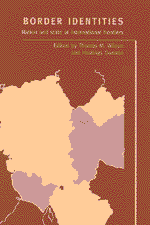Book contents
- Frontmatter
- Contents
- List of maps
- List of contributors
- Acknowledgements
- 1 Nation, state and identity at international borders
- 2 State formation and national identity in the Catalan borderlands during the eighteenth and nineteenth centuries
- 3 A western perspective on an eastern interpretation of where north meets south: Pyrenean borderland cultures
- 4 The ‘new immigration’ and the transformation of the European-African frontier
- 5 Transnationalism in California and Mexico at the end of empire
- 6 National identity on the frontier: Palestinians in the Israeli education system
- 7 Grenzregime (border regime): the Wall and its aftermath
- 8 Transcending the state? gender and borderline constructions of citizenship in Zimbabwe
- 9 Borders, boundaries, tradition and state on the Malaysian periphery
- 10 Markets, morality and modernity in north-east Turkey
- 11 Imagining ‘the South’: hybridity, heterotopias and Arabesk on the Turkish–Syrian border
- Author index
- Subject index
10 - Markets, morality and modernity in north-east Turkey
Published online by Cambridge University Press: 02 December 2009
- Frontmatter
- Contents
- List of maps
- List of contributors
- Acknowledgements
- 1 Nation, state and identity at international borders
- 2 State formation and national identity in the Catalan borderlands during the eighteenth and nineteenth centuries
- 3 A western perspective on an eastern interpretation of where north meets south: Pyrenean borderland cultures
- 4 The ‘new immigration’ and the transformation of the European-African frontier
- 5 Transnationalism in California and Mexico at the end of empire
- 6 National identity on the frontier: Palestinians in the Israeli education system
- 7 Grenzregime (border regime): the Wall and its aftermath
- 8 Transcending the state? gender and borderline constructions of citizenship in Zimbabwe
- 9 Borders, boundaries, tradition and state on the Malaysian periphery
- 10 Markets, morality and modernity in north-east Turkey
- 11 Imagining ‘the South’: hybridity, heterotopias and Arabesk on the Turkish–Syrian border
- Author index
- Subject index
Summary
… consider two ethnographic maps, one drawn up before the age of nationalism, and the other after the principle of nationalism had done much of its work.
The first map resembles a painting by Kokoschka. The riot of diverse points of colour is such that no clear pattern can be discerned in any detail, though the picture as a whole does have one. A great diversity and plurality and complexity characterizes all distinct parts of the whole: the minute social groups, which are the atoms of which the picture is composed, have complex and ambiguous and multiple relations to many cultures…
Look now instead at the ethnographic and political map of an area of the modern world. It resembles not Kokoschka, but, say, Modigliani. There is very little shading; neat flat surfaces are clearly separated from each other, it is generally plain where one begins and another ends, and there is little if any ambiguity or overlap. Shifting from the map to the reality mapped, we see that an overwhelming part of political authority has been concentrated in the hands of one kind of institution, a reasonably large and well-centralized state. In general, each such state presides over, maintains, and is identified with, one kind of culture, one style of communication, which prevails within its borders and is dependent for its perpetuation on a centralized educational system supervised by and often actually run by the state in question, which monopolizes legitimate culture almost as much as it does legitimate violence, or perhaps more so.
(Gellner 1983: 139–40)- Type
- Chapter
- Information
- Border IdentitiesNation and State at International Frontiers, pp. 237 - 262Publisher: Cambridge University PressPrint publication year: 1998
- 9
- Cited by



